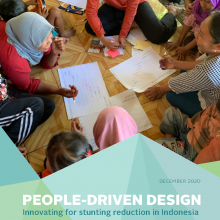Journal article
Jun 14 2022

Behavior Change Communication Implemented at Scale in Nigeria Increases the Prevalence of Key Infant and Young Child Feeding Practices (Current Developments in Nutrition, 2022)
Journal article
Feb 01 2022

Maternal and paternal involvement in complementary feeding in Kaduna State, Nigeria: The continuum of gender roles in urban and rural settings (Allotey, D., 2022. Maternal & Child Nutrition)
After an A&T program in Nigeria engaged fathers to support complementary feeding practices, this study investigated how household gender roles influenced child feeding in both urban and rural areas.
Journal article
Aug 18 2021

Combining intensive counseling by frontline workers with a nationwide mass media campaign has large differential impacts on complementary feeding practices but not on child growth: results of a cluster-randomized evaluation (Menon P., 2016. J of Nutr)
Complementary feeding (CF) contributes to child growth and development, but few CF programs are delivered at scale. Alive & Thrive (A&T) addressed this in Bangladesh through intensified interpersonal counseling (IPC), mass media (MM), and community mobilization (CM).
Guide/Manual
May 24 2021

People Driven Design: Innovating for stunting reduction in Indonesia
To inform a refresh process of the Government of Indonesia’s National Strategy to Accelerate Stunting Reduction 2018-2022 (StraNas Stunting), and the subsequent localization of
Journal article
Dec 10 2020

Assessing the Economic Feasibility of Assuring Nutritionally Adequate Diets for Vulnerable Populations in Uttar Pradesh, India: Findings from a “Cost of the Diet” Analysis (Kachwaha, S., 2020. Current Developments in Nutrition)
This study conducted surveys in Uttar Pradesh, India, to examine food prices and consumption patterns.
Journal article
Feb 25 2020

Different combinations of behavior change interventions and frequencies of interpersonal contacts are associated with infant and young child feeding practices in Bangladesh, Ethiopia, and Viet Nam (Kim, S., 2019. Current Developments in Nutrition)
This article demonstrates that exposure to interventions matters for impact, but the combination of behavior change interventions and number of interpersonal counseling contacts required to support behavior change in infant and young child feeding are context-specific.

